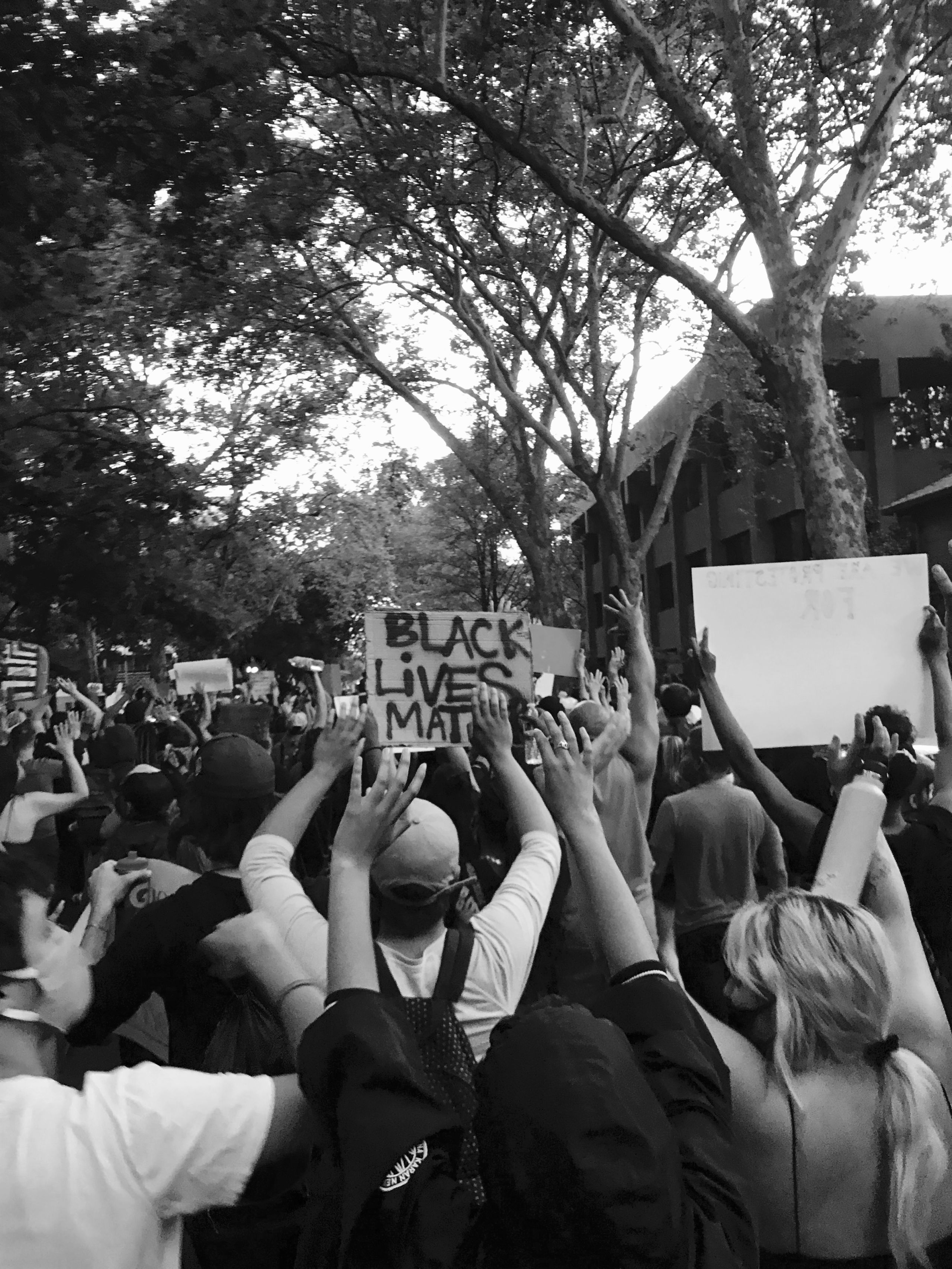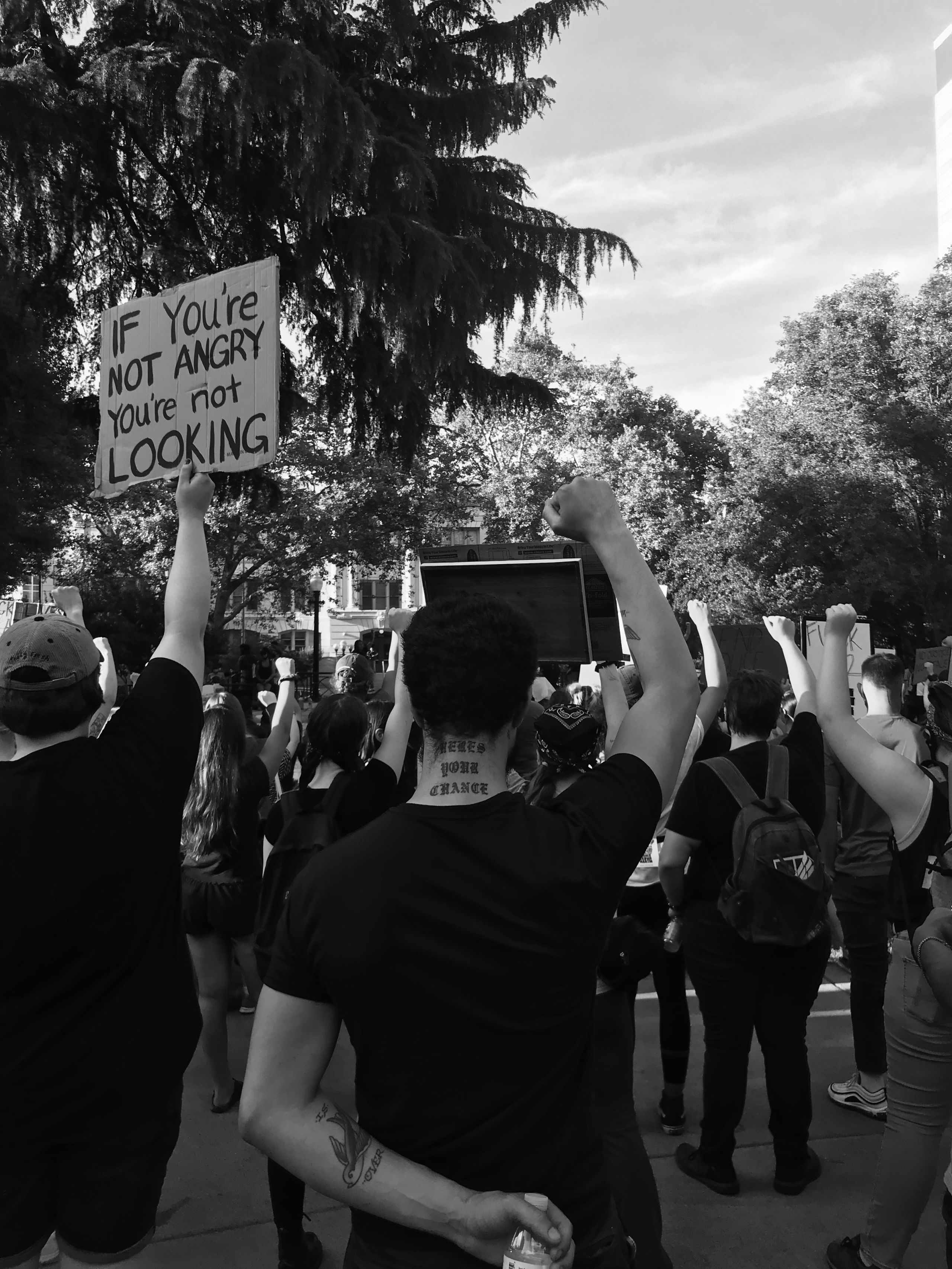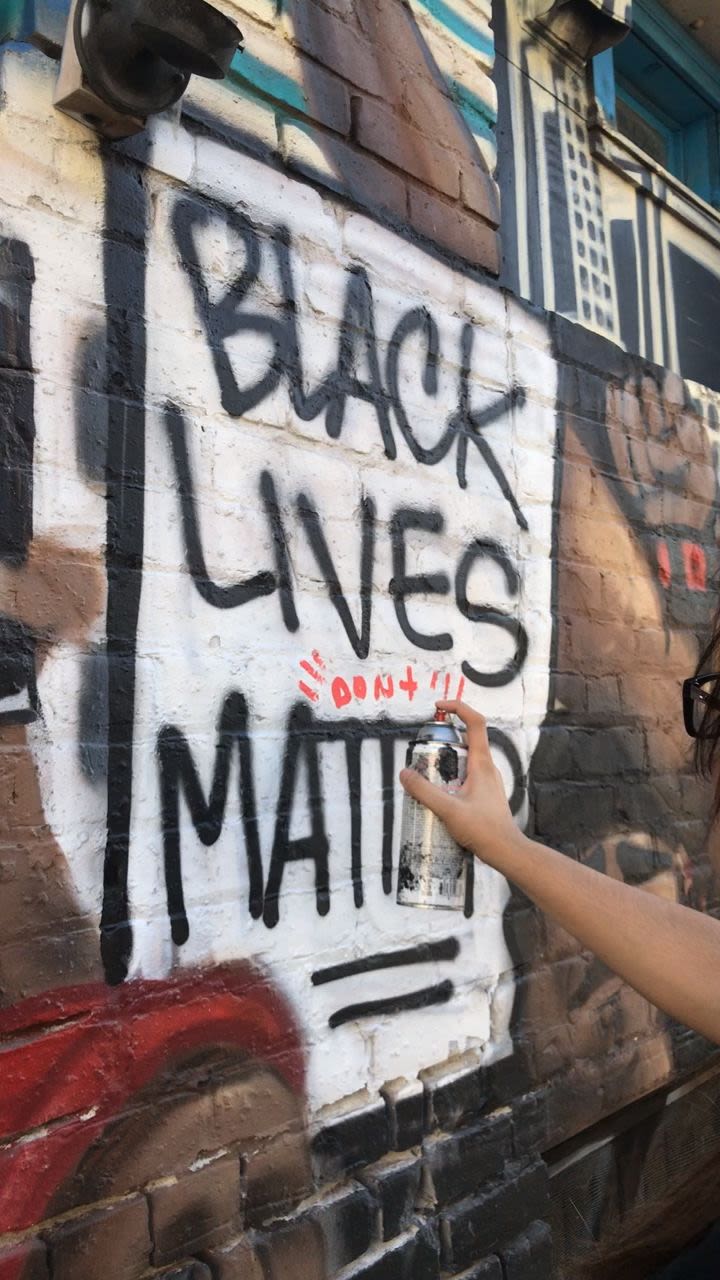"We can't Breathe"
A Inside look into how Social media Influenced a global movement
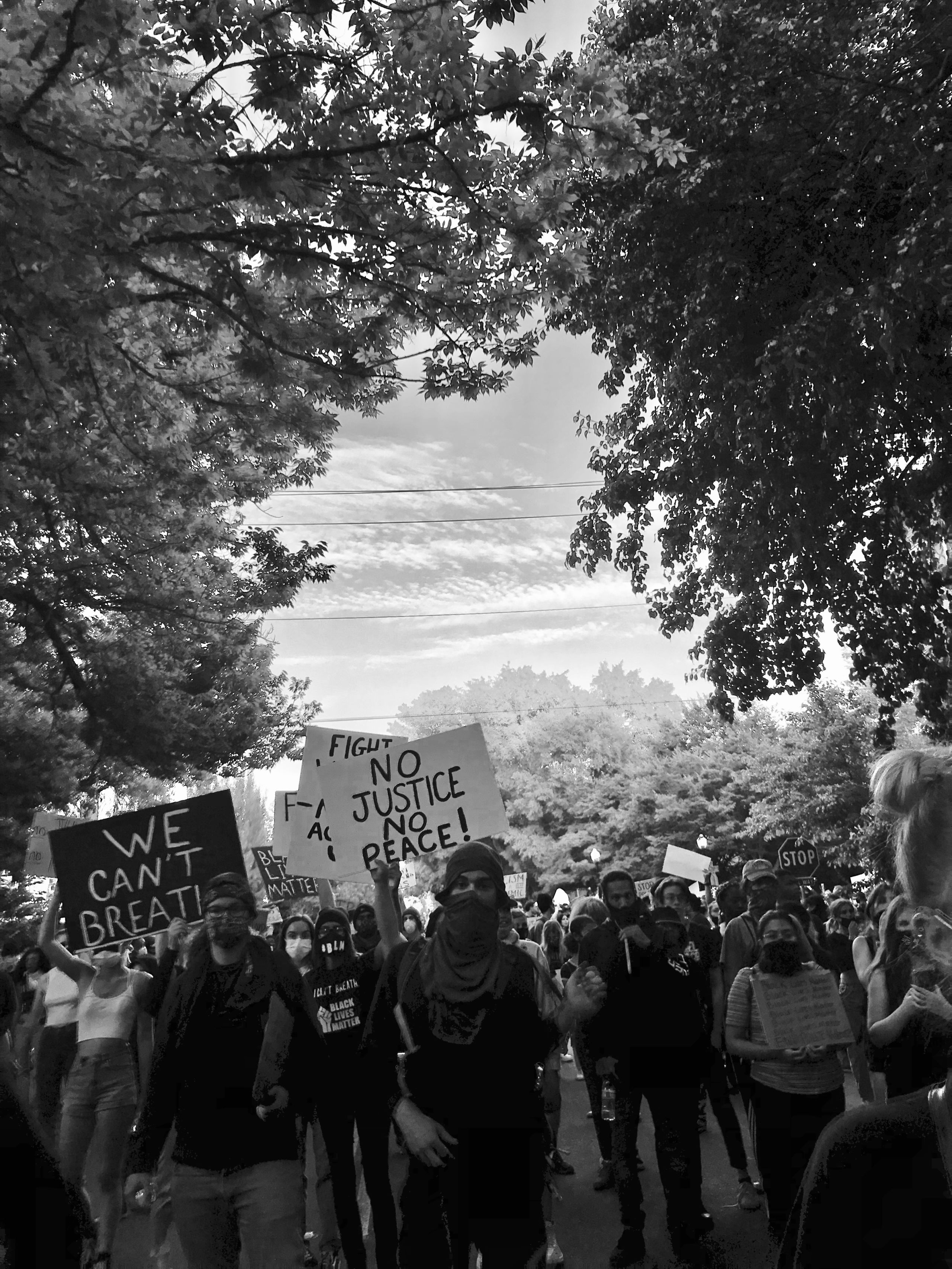
On the 25th May, thanks to the invention of camera phones and social media, the world witnessed the inhumane murder of George Floyd. The murder of George Floyd was documented for the whole world to see, it felt as if time stood still. It was though people, especially those privileged enough to not have to experience racism, had finally realised and woken up form the depths of their ignorance, to finally speak and say ‘we need change.’
Looking back at my own social media the numbers truly show how immense this movement was. My social media feed was flooded with Black Lives Matter posts and antiracism resources. On Instagram, Floyd’s hashtag has garnered 5.6 million posts according to The Washington Post.
The saying walk a mile in someones shoes stands out to me when thinking about this movement. As I know I will never be able to imagine living a Black life, because its not something I will ever experience. But I know that when another Black American is killed by individuals who are trained to protect its citizens, it opens up wounds which go back generations of injustice and racism. Especially for my friend Nicholas Guy who I met at a Black Lives Matter Protest in California. This person opened up my eyes to the power authority figures hold.
Throughout the 21st century, social media has illustrated and provided a platform which has improved the quality of Journalism we see today. It has provided a safe space where individuals can promote, share and engage with millions of people globally. From issues ranging from celebrity gossip to significant social issues. Traditional Media outlets lack the freedom and unfiltered censorship which is something Social Media platforms like Twitter and Instagram allow. Platforms like these allow individuals to post the reality of life, the raw unfiltered experiences in real time. So when comparing the two, Social Media has a unique advantage.
Social media is predominantly favoured as a news source among the younger generations whilst older generations tend to favour the more traditional sources of media for their updates. On the country it is crucial to realise that no matter the differences of age, we live in a world where unfortunately racism still exists and is still such a prevalent issue. In order to move towards change we must be guided by those who have witnessed and experienced this sort of brutality. Nevertheless this just shows how significant the unfiltered freedom and raw footage the internet provides. It is evidently the most effective weapon to help bring to light the racism that exists in our society.
The death of George Floyd sparked a fuse. Demonstrators all over the world are recorded chanting “Say their names” during peaceful protests and marches. Sadly their is a long list of names which during these protests, have been used to shine a spotlight on the amount of Black People murdered by police officials. But in terms of significance George Floyds name had the most social media influence. His name caught more attention on social media; through posts, likes and comments, then the hashtag #blacklivesmatter. His name caught the attention of 1.1billion shares just during the 30days after his tragic passing.
After living in the states for several months, I got accustomed to the different way of life it was fun and exciting. Being able to see how an individuals lifestyle can be so different based on where they live.
Once coronavirus had entered 2020, the way it was showcased in the media by American news compared to British news was quite humorous. American news channels operate on fear, keeping their audiences engaged with the idea their very survival depends on keeping updated with the news. When the unfortunate brutal murder of George Floyd,came to media attention it was as if the entire country woke up.
There were protests all across America. First George Floyds home town of Minneapolis then around the globe. At the time of the protests I was a student living in the capital city of California; Sacramento. Experiencing the protest from the eye of a foreigner, it felt as if I was witnessing history. The crowd of people was unfathomable. People from all walks of life; white, black, asian all coming together for a sole reason. To stand up to equality and say enough is enough.
The protests were all day events. The first time I went to the protest I was nervous maybe even a little scared, not knowing what to expect. The news portrayed the protests in a way that illustrated negative views of the movement because of the rioting and looting that was taking place as well.
It just so happened to be the day the governor of California, Gavin Newson, placed a nationwide curfew not because of the corona virus but because of the riots that were taking place. This fact however reasonable, in terms of actually first hand witnessing how violent some protests were, the rule did portray a message of silence. Silencing the voices, the cry of people who had lost their loved ones to a miscarriage of injustice. People like George Floyd, People who can’t breathe.
The first night of the curfew was the night me and my friends attended the protest. We reached the protests at the state capital around 5pm. The event was beautiful, so many people came together, to not only protest against police brutality but to celebrate the loss, to celebrate the life of George Floyd.
There were speeches, tears and peaceful marchers. When the time hit 7:30pm The speaker of the event turned to the crowd and made sure everyone was aware of the curfew and we are all responsible for our own actions but I still remember the words he said next
‘ Do not let this curfew silence you’
We took to the streets. A huge crowd followed. Speaking as an outsider witnessing how other countries handle injustice, was overwhelmingly powerful. The uproar when an injustice has occurred can say a lot to the way the UK deals with atrocities.
The military was called and bought in to police the area, the heavy gear and manpower was intimidating and made me question if it was really necessary to bring all this authority to a peaceful protest.
The curfew did not affect the mass of people who came together to bring light to the issue of police brutality. People of all races came together; white, black, asian all for the sole purpose of exposing institutionalised racism.
As a curfew was in place the crowd of people got smaller and smaller. Military police were at the end of every street closing protesters in. The time was now 9:30pm and we were now two hours after curfew. We decided to head back home but on doing so we were stopped and questioned 4 times by different law officials. As an outsider the fact that these restrictions were being forced on individuals in a country which ethos is all about ‘freedom of speech’… made the least sense to me. Not to mention a tad bit racist.
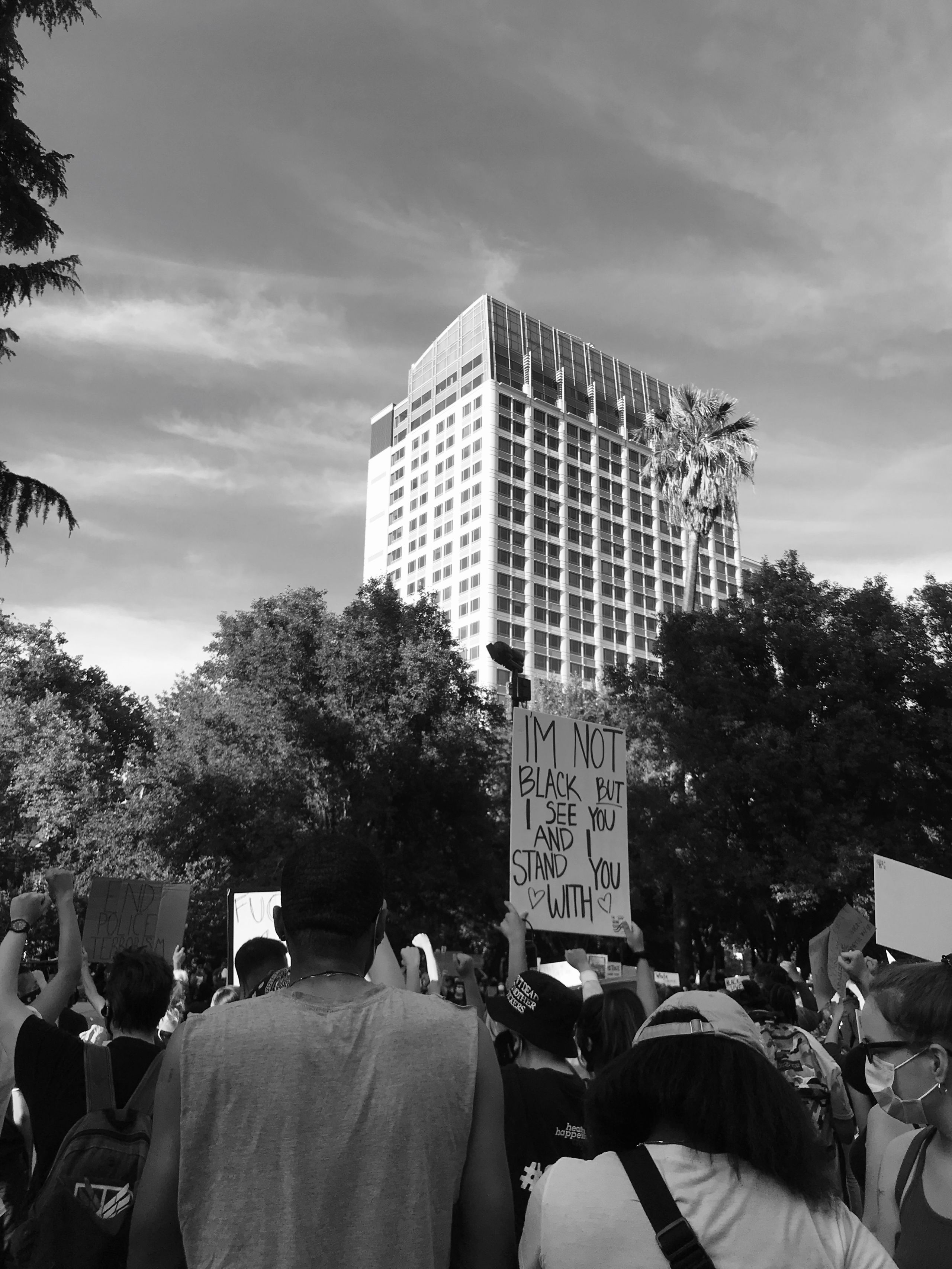
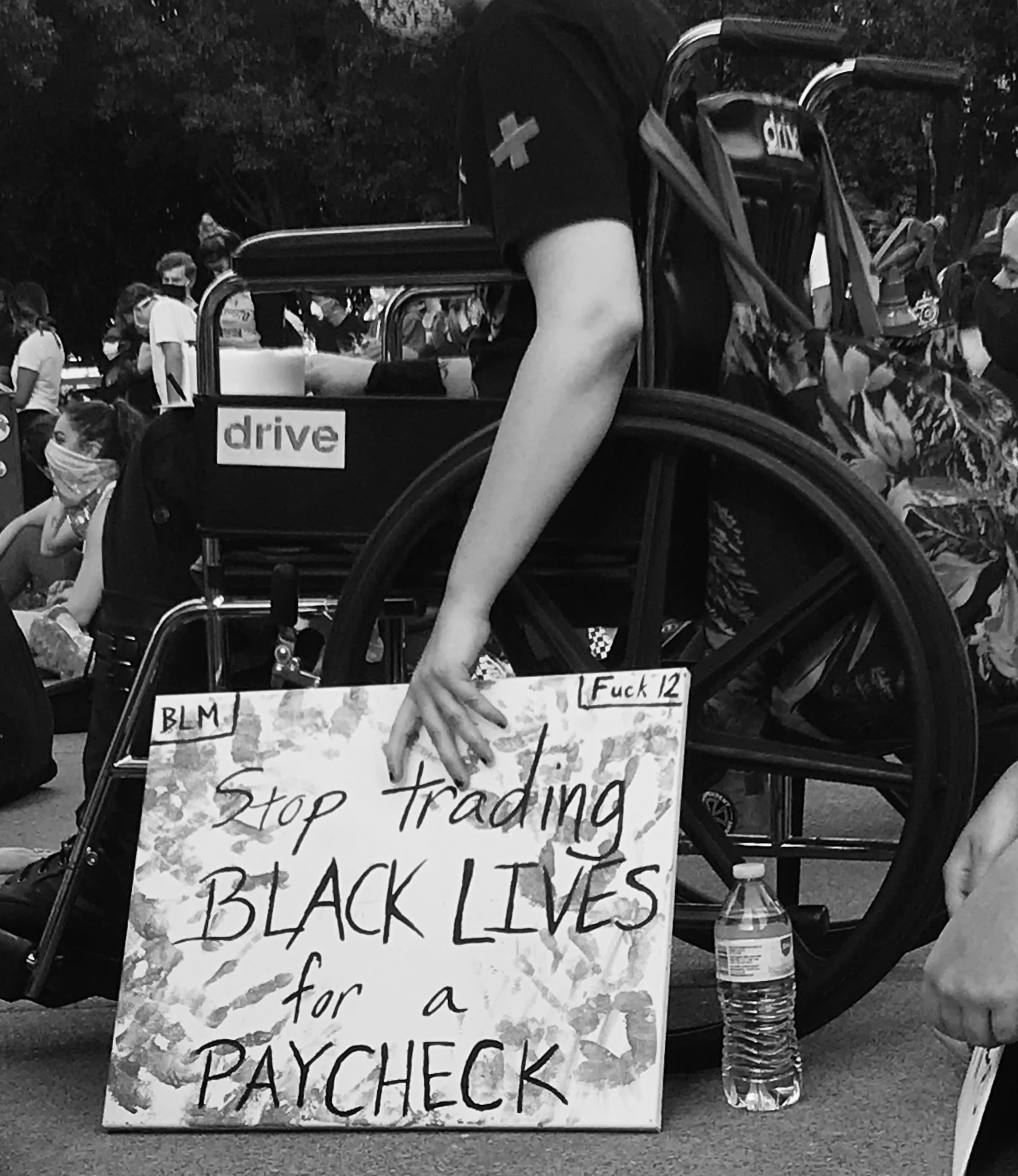
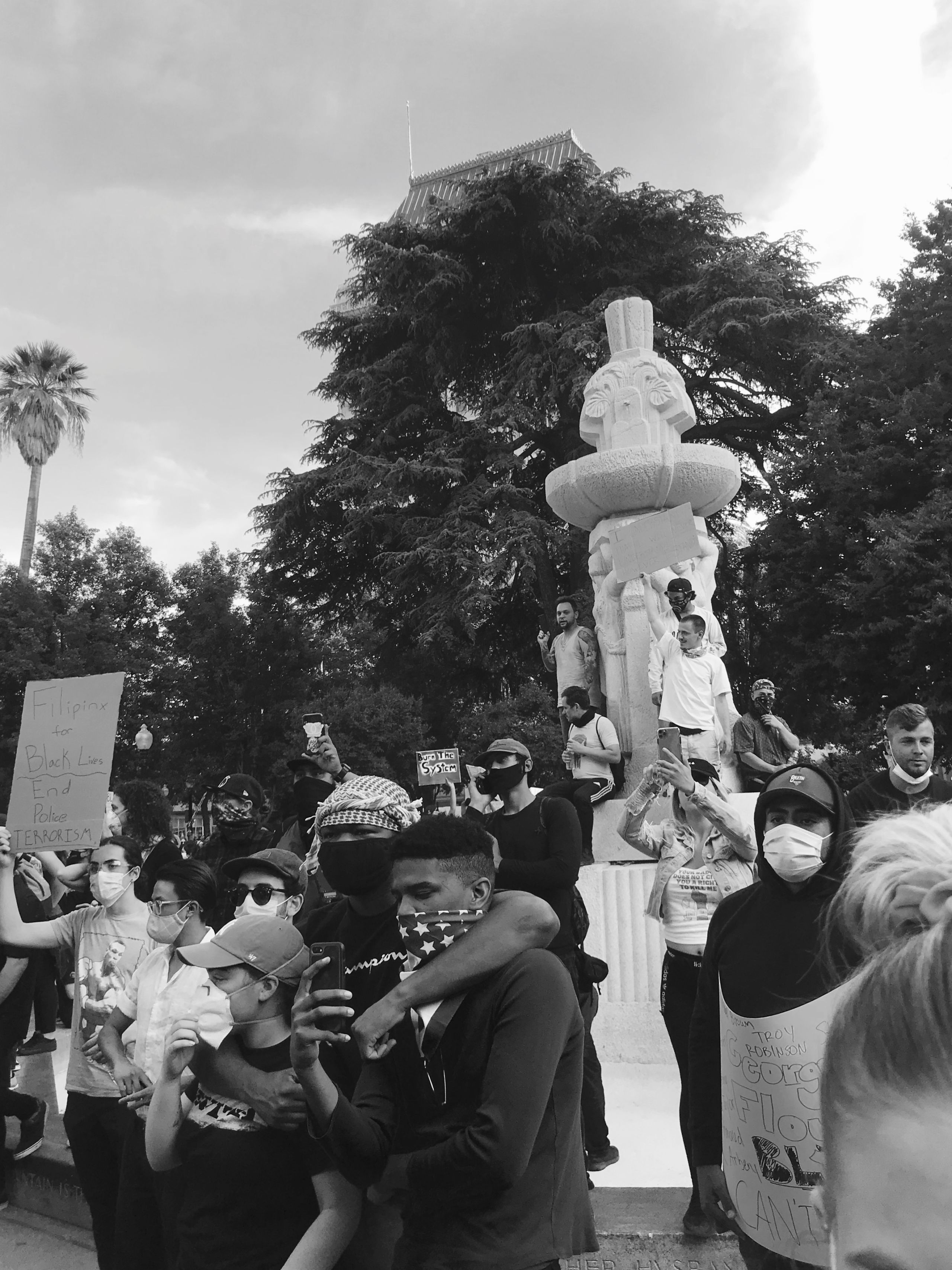
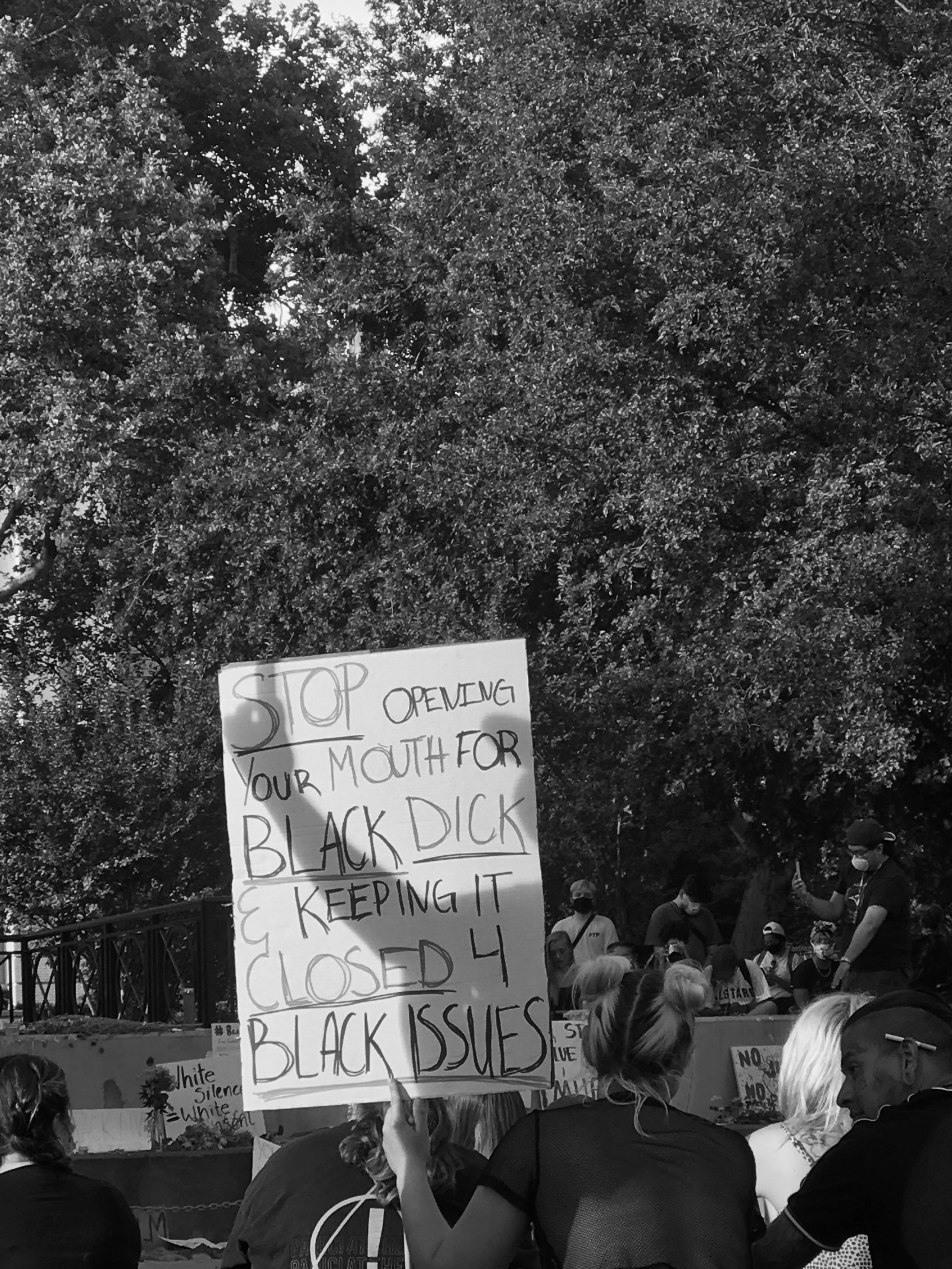
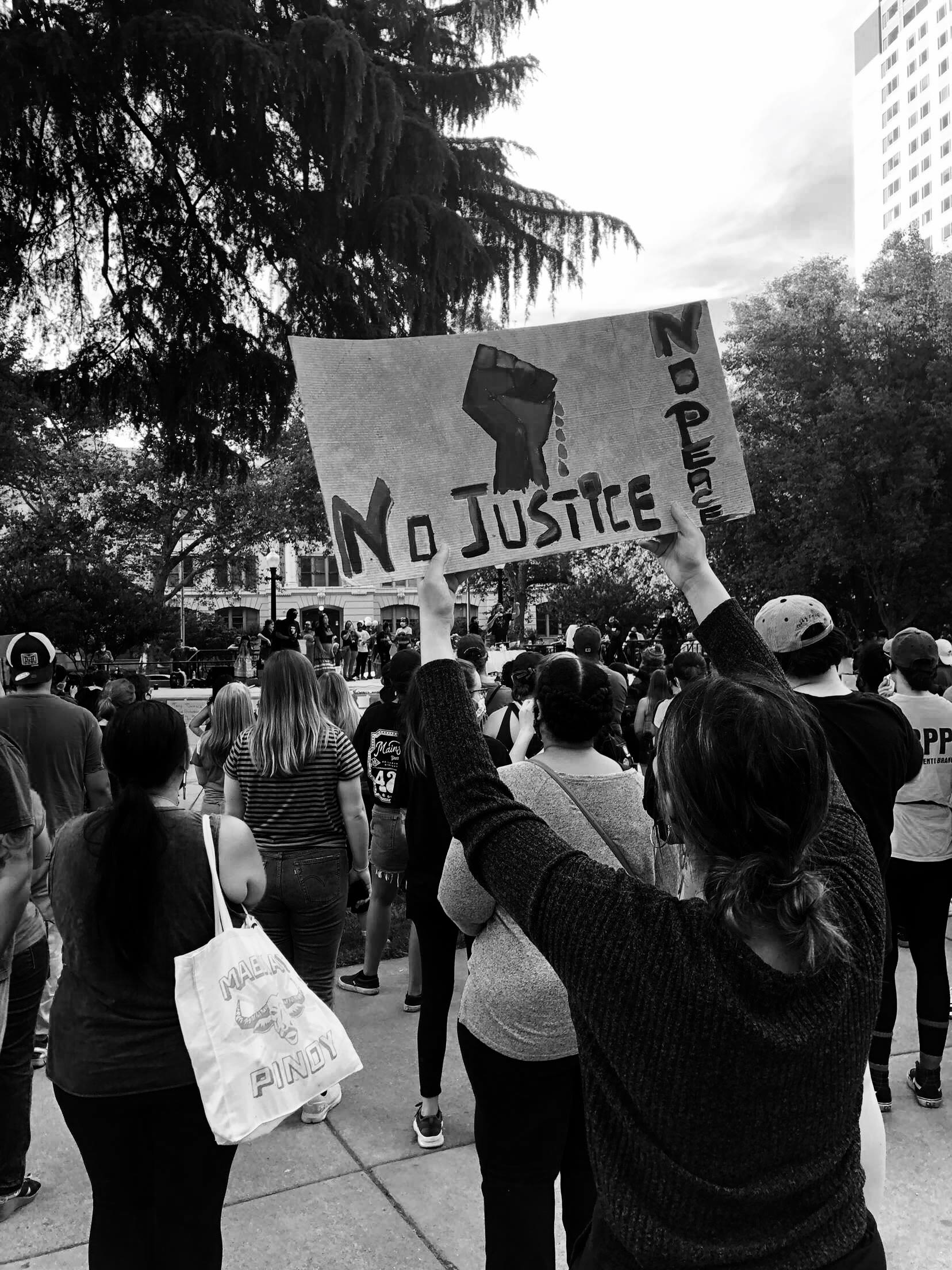
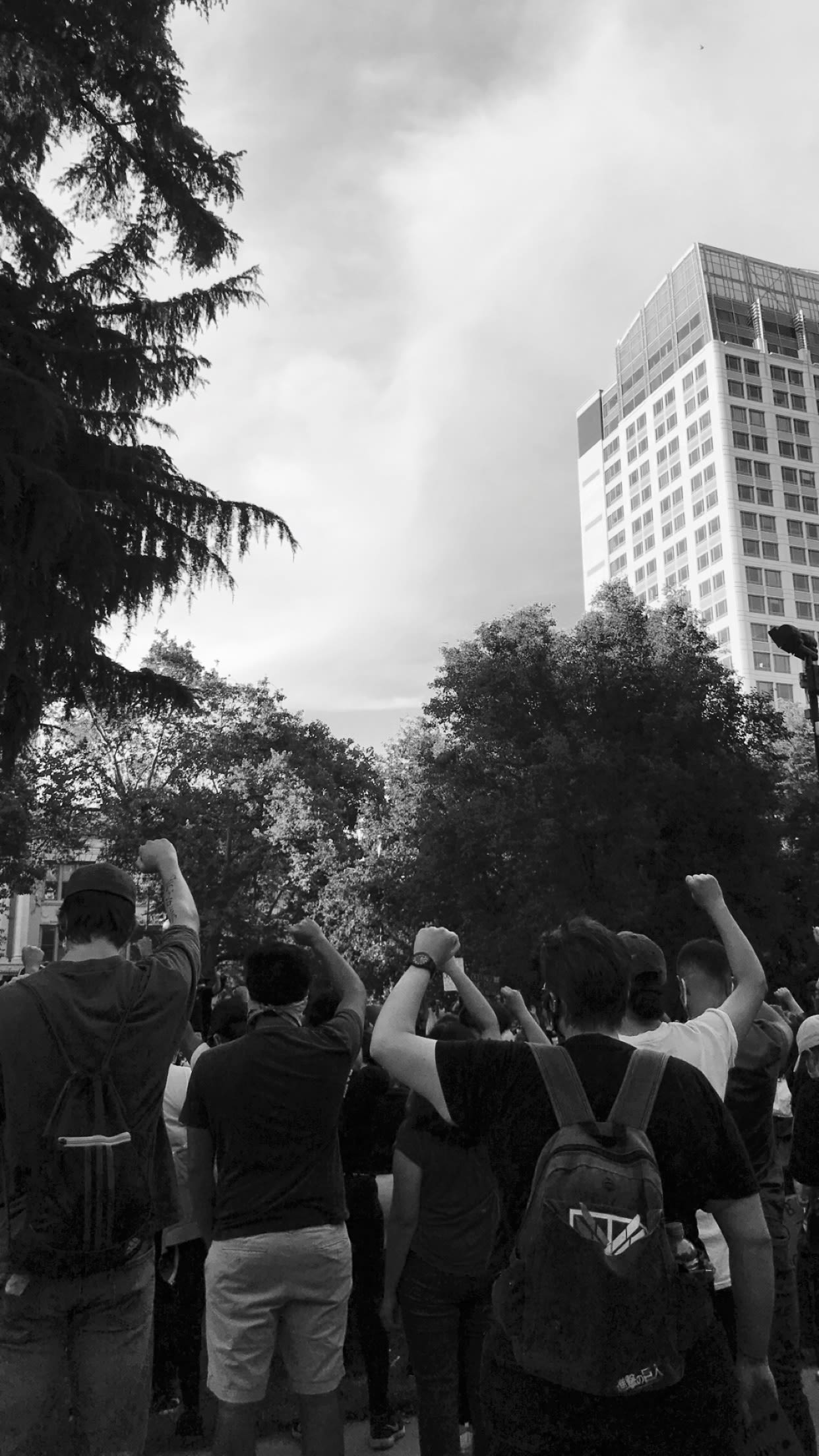
The night of the protest ended. Looking on the bright side of things I met some amazing individuals at the protest, one who was briefly mentioned. Nickalos Guy is a 23 year old university student majoring in communications. This is his story. He mentions struggling with breaking the stereotypes that singles him out and causes him to be treated differently by society.
“Growing up in America I faced many struggles as a Black African American. There are things like social security and welfare that are supposed to help underprivileged Americans but instead these polices keep poor Americans poor”
As a Black African American I have faced many struggles. Racial stereotypes hurt the most. Being classed as a black man in America; a huge stereotype is the fact people look at me and see a criminal. I think thats what made the George Floyd movement so powerful to me. People especially white people were seeing life from our point of view. They were ready to listen.
The truth is I don’t know if this movement is a step in the right direction. A lot of people are coming together and standing up against police brutality which is amazing. In order for us to see real change we must as a society come together and educate ourselves through our personal and intimate relationships between our white friends and people of colour. We have to be able to provide a safe space, a window into the lives of people who are affected differently then ourselves.
In order for us to move past from this, and create a future where we all feel safe, we need to do better. White people need to do better. They need to be open to listening, form relationships, pay time and effort to the struggles a person of colour faces. The ignorance from the indifference has lead White people to see inequality as invisible. Its like the air we breathe. The air is invisible until white people choose to acknowledge its there.
There are a large majority of "white" Americans who believe that if "resistance" should allow for police to use deadly force. Assault is a forcible felony in half the states. Forcible felonies permit deadly force. The problem is police officers and media spin "petty crime", and "nonviolent crime" as forcible felonies.
I asked Nicholas what he thought of Celebrities using their power to spread awareness to the issue. “The celebrities that grew up in these places where police abuse their power had good intentions. Although there are a few acceptions. The affects from many other celebrities seem like performative activism to me.”
Nicholas added he sees a clear difference to the way accredited news stations reported the movement and how Social Media portrayed the movement. “News stations will often spin a story in order to create a narrative to manipulate public political opinion. Social media and LOCAL news stations are the best sources of first hand information because they tell the story from a raw perspective. Its best to look at first hand things and interpret information for yourselves. Avoid arguing in comments on social media its pointless.”
What the news fails to do, is where social media succeeds. Throughout my time in America and from what I witnessed throughout social media was the astonishing difference between the two. The movement was documented by news industries as destructive. The rioting and the looting was broadcasted on the news channels far more then the demonstrations of peaceful protests that were taking place globally.
Throughout social media platforms such as Twitter and Instagram, were drowned in tweets and post celebrating the movement. An example of the difference is clearly demonstrated in this clip shown on Fox News which focuses on the rioting and the looting without looking at the underlying issue. The Independent also does something similar
This proves Social media is a new form of activism and has clearly helped spread the movement globally.
Lauren a law student attending Macquarie University in Australia, explains how significant this protest was and the impact it had globally. She agreed to be interviewed and provided a perspective into how impactful social media is for a global movement.
As the movement spread globally, I was curious to see how someone who grew up with the advantages of being white saw the movement.
Growing up what are some struggles you’ve faced or found from other people?
“I’m white and live in an almost entirely white area so I can’t speak for personal experiences of racism. However in Australia I do know that over 50% of youth in custody are Indigenous even though they’re about 6% of the general juvenile population. At some point 100% of youth in custody in the Northern Territory were Indigenous. Indigenous children are also much more likely to be strip searched (I think 21x) so there are definitely issues with racist policing”
Do you think this movement and the rapid acknowledgement since the death of George Floyd is a step in the right direction?
I think more people talking about racism beyond legislative reforms is a step in the right direction. Also historically major societal changes have resulting from protest (civil rights, gay rights, women rights, workers rights etc). However, there is also a major problem of symbolic action, e.g Breonna’s law which prevents no-knock warrants but no action taken to charge her killers
How did you feel about the impact of celebrities spreading the message about the movement? Do you think it distracted the main message ?
Celebrities can be great for spreading a message or adding pressure due to their wide reach and audience, however it does also run the risk of either a) spreading some misinformation or b) taking voices away from people of colour (e.g white celebs being congratulated for their action but they talk over black voices)
Do you think theres a clear difference in terms of how Social Media covered the issue compared to accredited news channels?
Yes but that’s also because social media shows me left leaning sources since they track your interests. If I was right wing the algorithms would show me completely different covering of events. As for news, I think it differed dramatically by region. Australian news coverage of BLM protests in America were often more sympathetic to protesters than some USA News I watched. But Australian news typically framed Australian protests in a more negative light. It seems that official news sources are less likely to be positive about protesters going against their own government.
Lauren made the comment ‘I don’t watch the news often enough, so I don’t think I would have known the full extent of the circumstances around George Floyd’s death without social media. It has served to educate me on the wider history of the Black Lives Matter movement, and on my own privilege.’

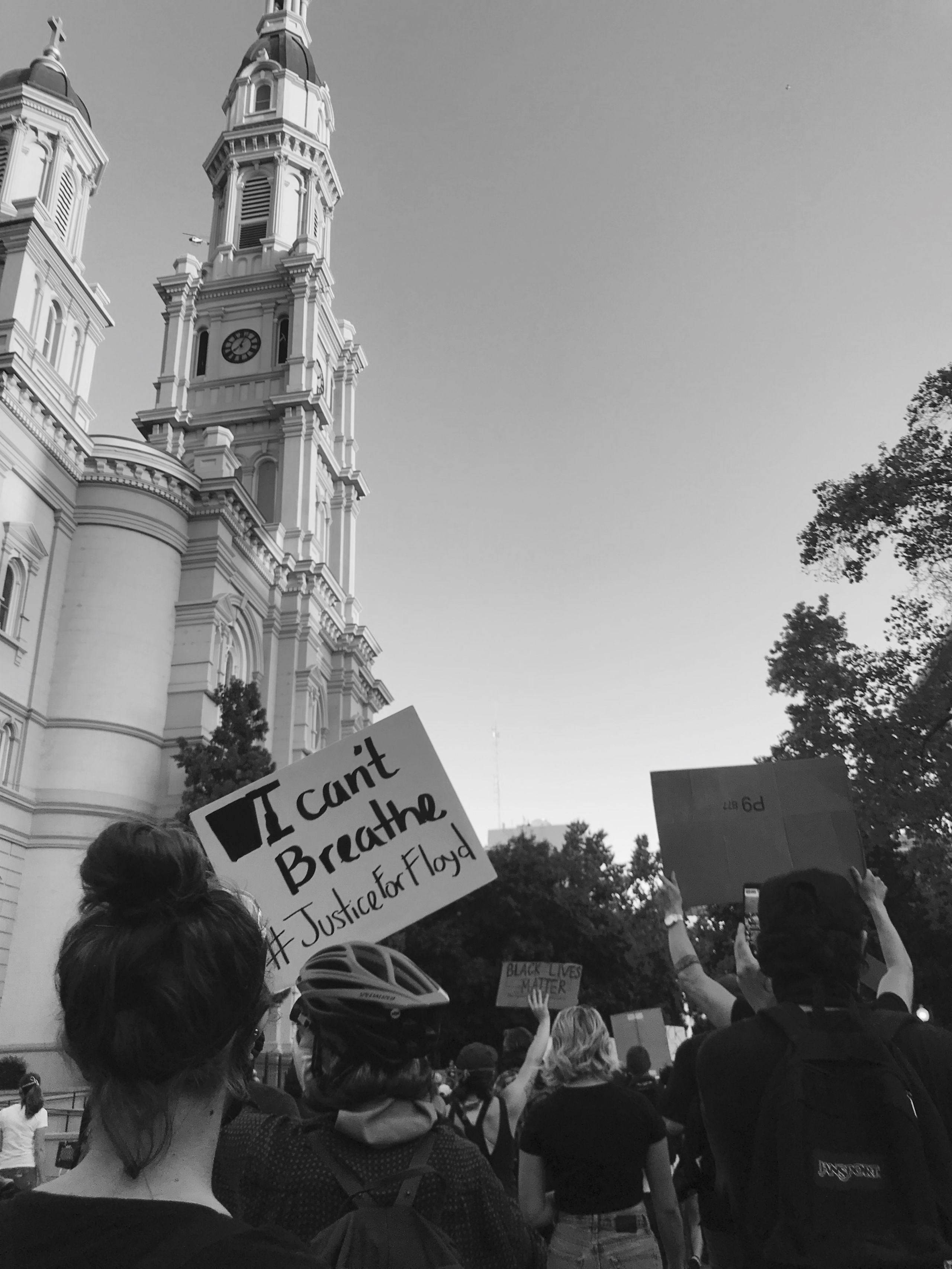




George Floyd’s death was what turned BLM into the global phenomenon that obtained all our attention in 2020. The waves of protest soon moved the movement from the United States to around protests across the globe and started the conversation that no country is innocent regarding matters of equality.
Neechole Mendoza Law student from Sheffield took part in organising a protest in the United Kingdom. The 2nd year Law student also a talented painter shared with me her memories from the movement and her experiences.
“Communites from small towns, even predominantly white communities, advocated and helped come together as if to say this is enough. Voices were being amplified, people were being heard. Having cameras on our mobiles has helped spread this movement to grow as significantly as it has. I think Social media has not only helped bring people together and allow these voices to be heard, it has become a place where are screens are filled with activist media”
“Literally every time you go on your timeline, you’re seeing something about BLM, You have to engage with the content.”
Neechole argues the main difference between Social media and televised news channels is it calls for accountability. Social media has the power to influence people to speak up about social issues, it has the power to put pressure on politicians and brings to light the injustices of the world. Social Media also has the power to control and sway companies and brands to speak out and take a stand against police brutality.
Neechole adds that it’s clear in the modern age of social media that in order to spread the word on significant social issues we have to create simple ways of communicating and accessing campaigns in order for them to go viral.
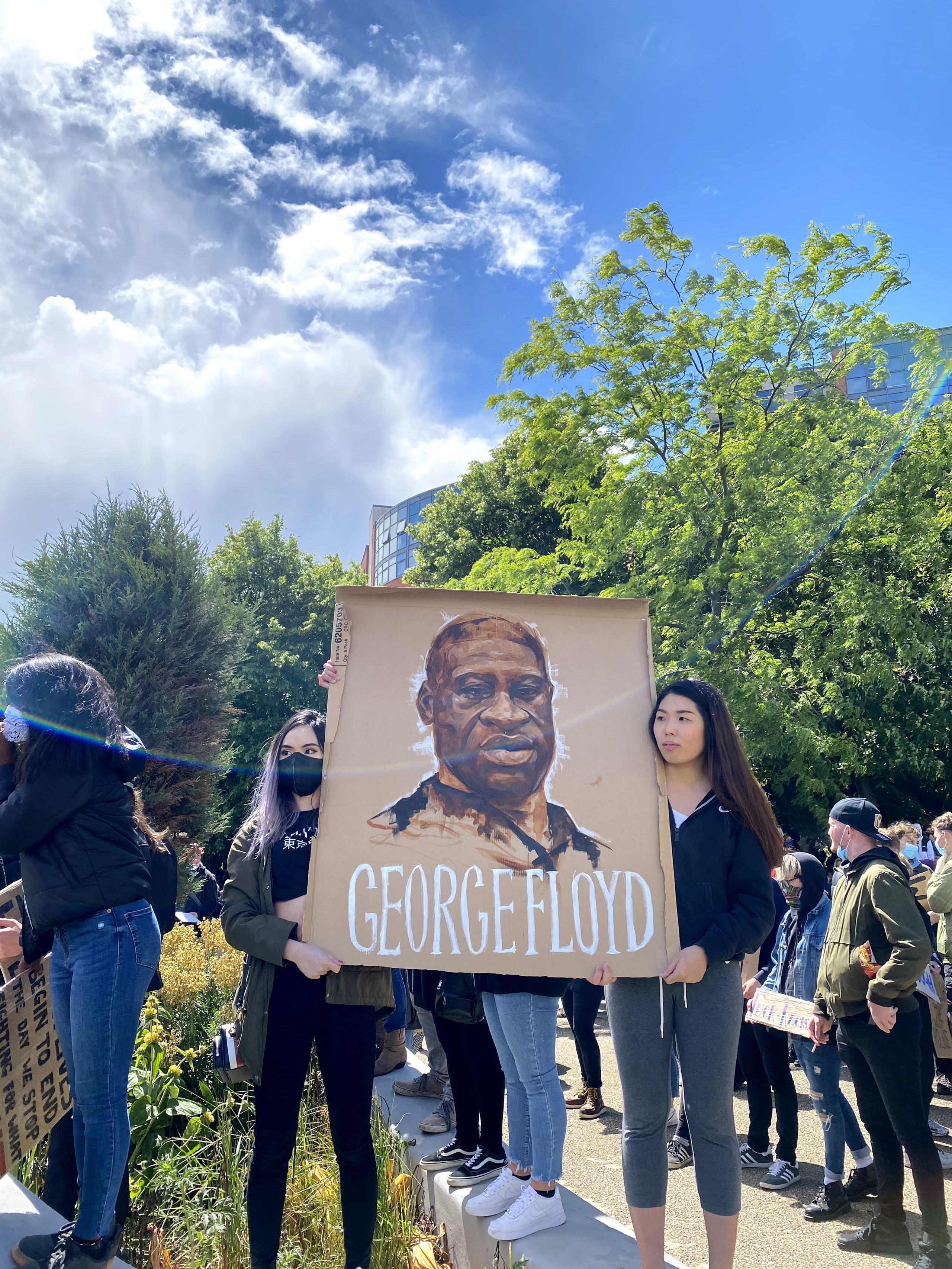
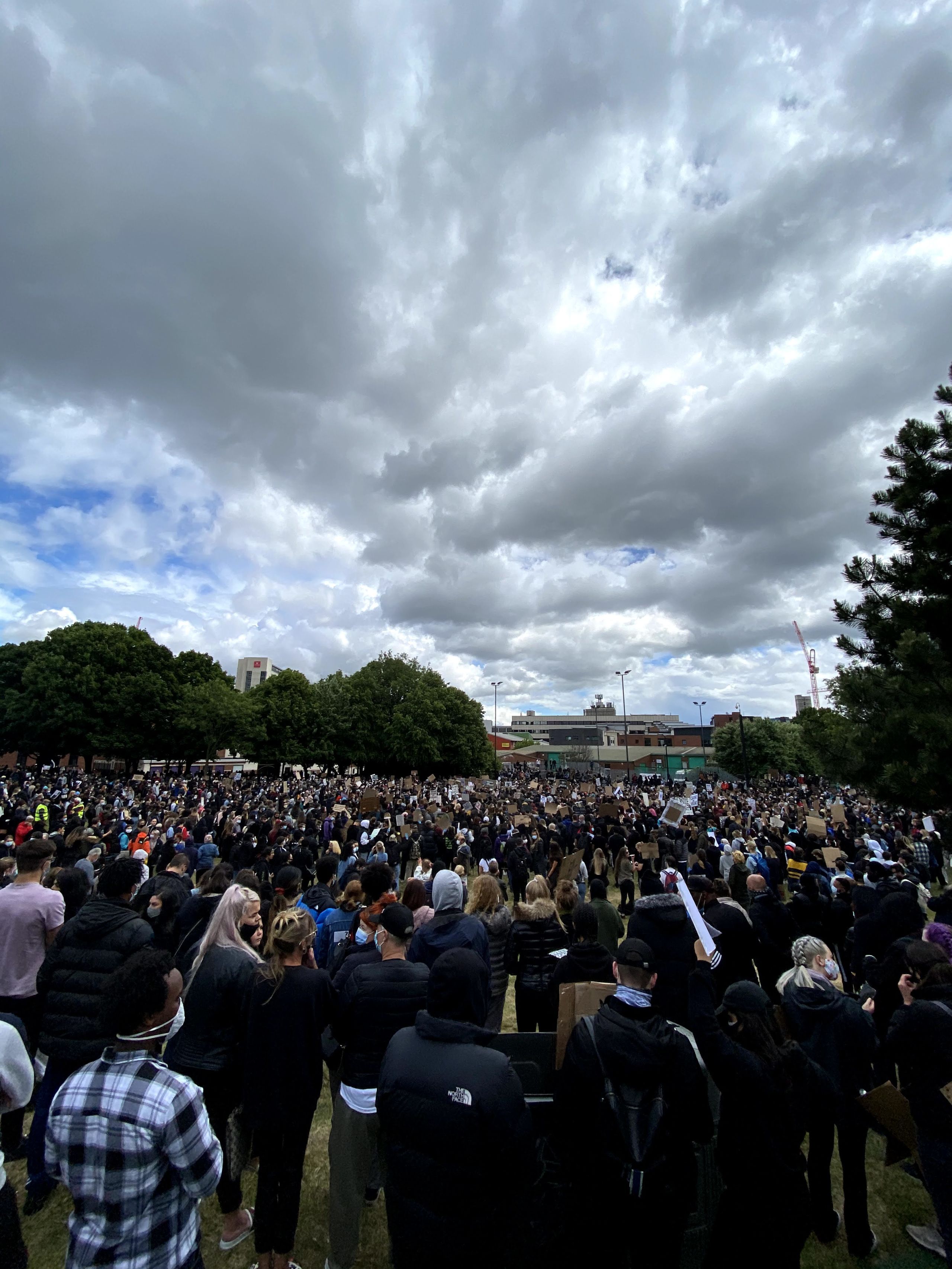
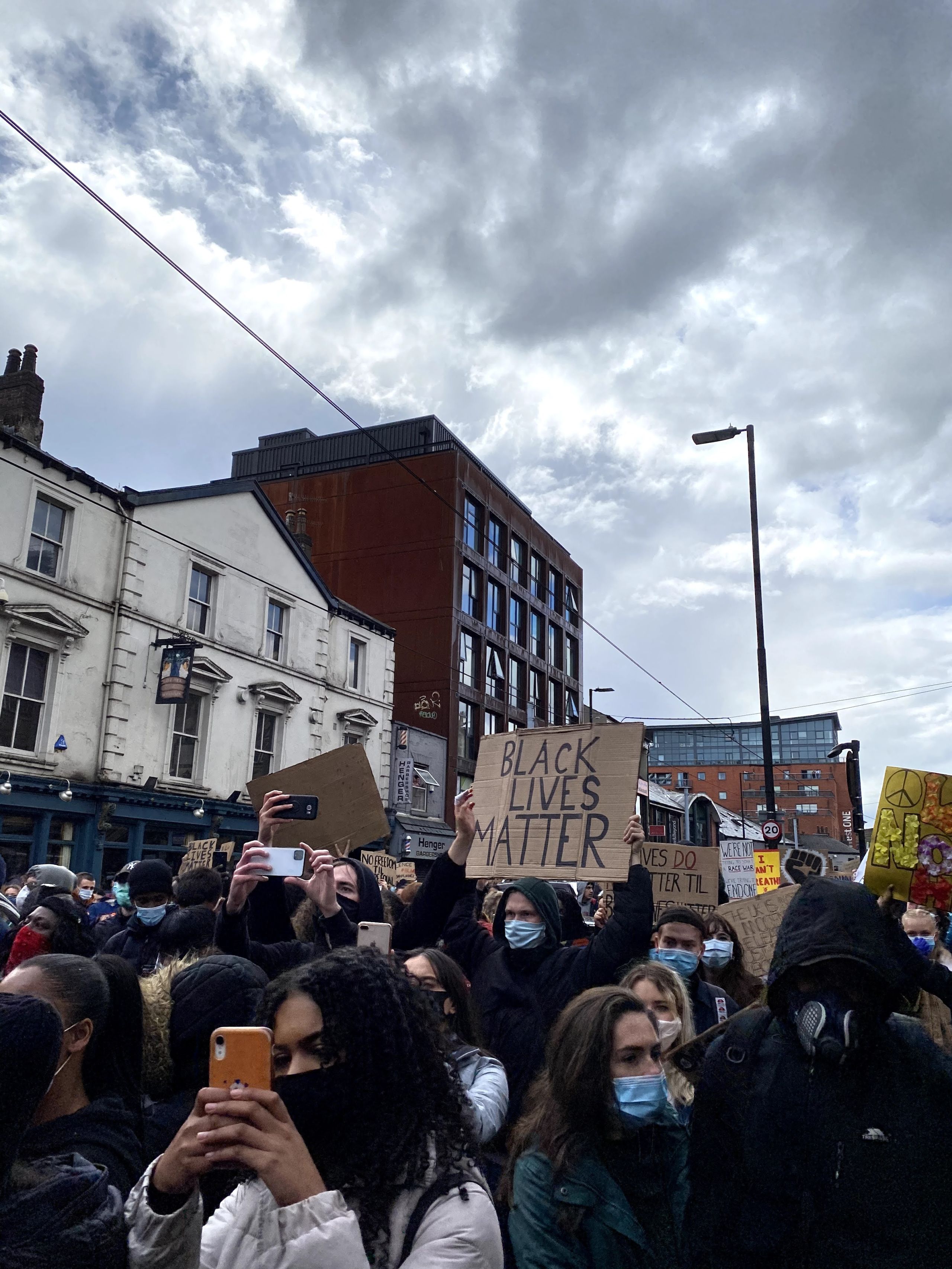
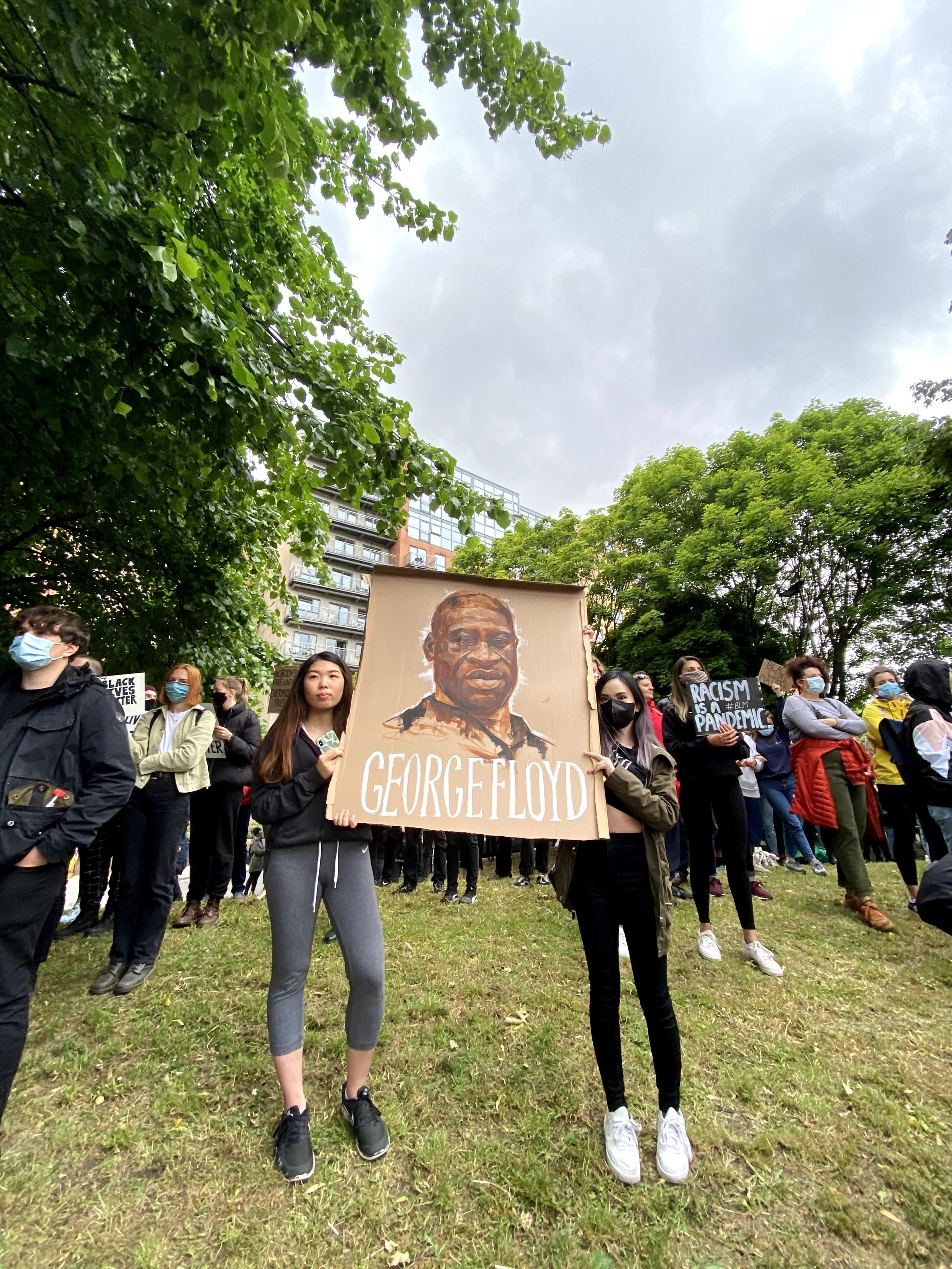
Masters student Quainsiha Virgrnity studies Media at Leeds University. Her insights were powerful, not only as a Media student but as an individual who identifies as Black and British. Her perspective helps illustrate how impactful this movement had on her.
Being a media student how important do you think Social Media is in terms of reporting news?
In my opinion social media is an incredibly important aspect of reporting news. While I check the news app on my phone quite frequently, I also get updates from twitter from sources like sky news etc. Additionally, I am subscribed to various news outlets on Snapchat. This is beneficial as it sometimes shows me stories that I would have never come across otherwise. However social media is an amazing source of news when mainstream media has failed to report on certain topics e.g. the awful treatment of Uighurs in China.
Do you think there is a clear difference between the stories reported on TV compared to social media?
I wouldn’t say there is a clear difference as you can commonly find stories that are promoted on both mediums. Sometimes stories reported on TV will make it onto social media and vice versa. However I do think that it is more common to find the uncensored versions of the story on social media as you can get the accounts of those who were actually involved (rather than just those who are willing to speak on camera). Additionally, video proof tends to circulate on social media more as they can share distressing content more easily and without copyright or litigation issues.
Do you think the impact of social media as a form of activism can change our future?
I think it definitely has an impact on how movements band together and have protests as it makes it incredibly easy to communicate with a large audience. However, the internet is also increasingly full of “fake news” (for lack of a better term) which makes it harder to distinguish between genuine news stories that require activism and fictionalised events. For example, an invitation for a BLM protest in Leeds circulated however it was ultimately cancelled as it wasn’t created by the official group.
Do you think social media helped people realise the extent of police brutality and the problems black people face globally?
I wouldn’t necessarily say the surge in support for BLM was entirely due to social media as it has been used to report on police brutality preciously with Trayvon Martin etc. I think the movement/black issues in general became so prominent in 2020 as we were in a pandemic, which caused a lot of the public to be outraged with the government/authority anyway. Additionally, as we were in lockdown/ reduced social contact, many people spent extra time on social media out of boredom which lead to increased sharing/ viewing of this kind of content almost as if it was a trend. Personally, by looking at previous incidents of police brutality that have been shared on social media, the rage is still prominent, photographic evidence is circulated and people attend protests. However, this all dies down pretty quickly once people can return to their normal lives.
Quainsha’s answers about how the pandemic of 2020 may have factored in how much attention the movement received is something that should be noted when discussing the impact Social media has. Does the fact the world was put on pause and people were more free to listen, to the injustices going on around them, affect how the movement was seen to certain individuals?
The Washington Post conducted research into how the pandemic influenced the media attention the movement, received. Its results showed that throughout both samples that those who are more likely to be financially hurt by the pandemic are more likely to take part in the protests. The results found that 69 percent of Black respondents reported being hurt financially by the pandemic, far higher than the 46 percent of White respondents.
Looking at Social Media and how it is used in the 21st century its no surprise of the impact it has making a movement like this go global.
Compared to News channels, social media has become a place to share resources, petitions and links for donations on a huge scale.
Official news channels, while they share details of the events, they often fail to showcase the bottom line. In this situation news channels focused more on the destruction and the rioting, filming and covering stories based on what attracts the most attention. Doing this leaves the reason for the protests to feel insignificant and allows individuals specifically white people to fall into the trap of stereotyping people of colour as a nuisance to society.
That being said it can also be particularly easy for white people to read on the issue and then fall into the sad excuse of “if only there was something I could do, at least I'm not racist” To not be racist isn't enough.
Social media offers a canvas which allows people to counter this. This generation has the power to use their voices and compile petitions, educate and support organisations.
Throughout all the activism clearly demonstrated on Social Media, it does have its cons, when we restrict our ‘activism’ purely on social media, theres a danger of it becoming a trend, that we will later forget about as time goes on. Social media provides an amazing platform, a place to listen to those who have experienced injustices personally. A place where we can educate ourselves and find resources. But its also a hollow wall.
What I mean by this, is once you post a story for example in support of the movement, the people who react to it are your friends, people who already share your beliefs and values. At some point the people you interact with online will simply stop looking at and interacting with the stuff posted on social media. They will simply choose to turn a blind eye. However that doesn't go to say the people that interact with the resources and petitions, doesn't benefit the movement. Its just important to remember to engage with real life conversations about these issues as well as virtual ones. It is incredibly important to talk to the people who do not already agree with you, whether that is in your family or in your wider social circles.
A credit to platforms like Facebook, Twitter and Instagram. These platforms have helped mobilise global support effortlessly. Activism has never been so straightforward. The access to petitions and resources at the click of a button is what makes change seem real. However the real work will be to making sure this does not stay a virtual trend that we engage with until its no longer trending but a step in the right direction to someday eradicate inequality.

